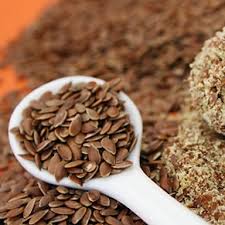 Flaxseeds - Hailed with burning body fat, being high in omega-3s and charged with fibre,
these little seeds can really fire up your metabolism.
Flaxseeds - Hailed with burning body fat, being high in omega-3s and charged with fibre,
these little seeds can really fire up your metabolism.
What are they?
The seeds from the flax plant can be used whole, ground to make meal or used to create a vegetable oil known as flaxseed oil (or linseed oil). Flaxseed is one of the most concentrated plant sources of omega-3 fats. Flaxseeds contain 50 to 60 per cent omega-3 fatty acids in the form of alpha linolenic acid. Flaxseeds are also rich in antioxidants, B vitamins, dietary fibre, a group of phytoestrogens called lignans, protein and potassium
The Pros of Flaxseeds
The seeds' high fibre content is beneficial for heart health, and the fact that they are a rich source of omega-3 fatty acids can help lower blood cholesterol and blood pressure. And the seeds (not the oil) can reduce total and LDL (bad) cholesterol by a significant amount, particularly in post-menopausal women. It is also found that ground flaxseeds slow the growth of prostate cancer tumour.
The cons of Flaxseeds
The omega-3 fatty acids in flaxseeds aren't taken up as well by the human body as the omega-3 in fish oil, which is why greater levels of flaxseed need to be consumed to meet our omega-3 needs. Care needs to be taken with storage, as flaxseeds are an unsaturated fat. Unless they're stored in a sealed container in a cool place, they can go rancid quickly. Flaxseeds, whether ground or whole, have a very high fibre content, so if you're introducing them into your diet, it's best to start slowly and increase the levels gradually to avoid cramping, bloating or an excessive laxative effect.
When not to take Flaxseeds
How to eat Flaxseeds
Flaxseeds are an ideal way for those who don't eat sufficient oily fish to ensure they get enough omega-3. Ideally, buy the seeds whole and grind them in a blender to make the meal. Flaxseed meal can also be used as a binder or egg substitute in baked goods for people who are allergic to eggs. The seeds can be sprinkled on fruit, vegies, cereal and yoghurt, while flaxseed meal can be used in baking or to bulk out meat dishes. This way you increase your omega-3 levels and fibre intake at the same time.
No comments:
Post a Comment